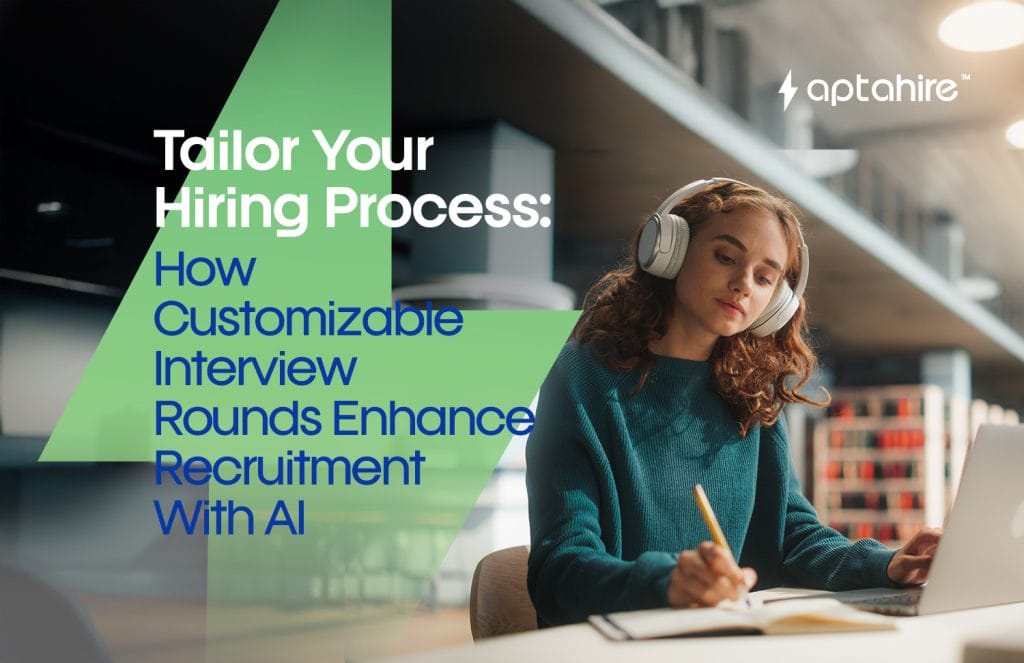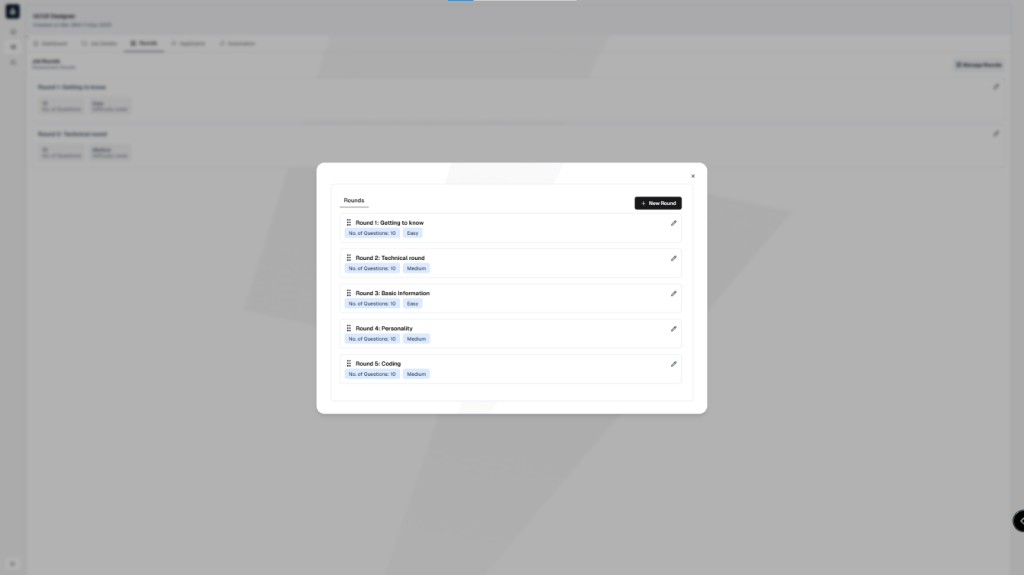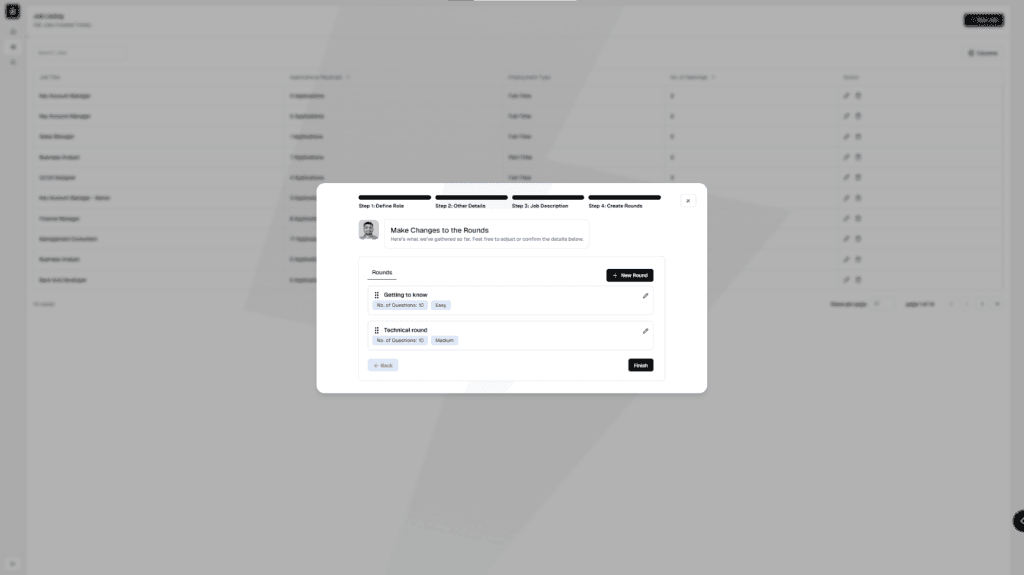How Customizable Interview Rounds Enhance Recruitment with AI

Introduction
Recruitment has evolved significantly in the past decade, with AI-driven technologies reshaping traditional hiring processes. One of the most powerful advancements is the ability to customize interview rounds using AI, offering a data-driven approach that enhances efficiency, accuracy, and candidate experience. Customizable interview rounds help businesses tailor assessments to their unique needs, ensuring they select the best talent while saving time and resources.
In this blog, we’ll explore how AI enables customizable interview rounds, the benefits it brings to recruiters and candidates, and expert tips to implement this strategy effectively. We’ll also explore real-world applications, industry insights, and the future of AI-powered recruitment.
The Evolution of Recruitment: From Traditional to AI-Driven Hiring
Historically, recruitment relied on standardized processes, resume screening, structured interviews, and manual evaluations. While effective, these methods lacked scalability and efficiency, often leading to bias, misalignment with job roles, and extended hiring cycles.
Enter AI-driven recruitment:
- Automated Resume Screening: AI scans CVs and matches qualifications with job descriptions.
- Intelligent Interview Scheduling: AI coordinates availability, reducing back-and-forth communication.
- Customizable AI Interviews: Tailor questions, assessments, and scoring metrics based on the role and candidate experience.
How AI Enables Customizable Interview Rounds
1. Dynamic Questioning Based on Candidate Responses
AI-driven interview platforms analyze candidate responses in real time, adjusting follow-up questions dynamically. This approach:
- Mimics human-like conversations, improving engagement.
- Allows deeper assessment of technical and behavioral competencies.
- Eliminates generic, one-size-fits-all questioning.
2. Role-Specific Skill Assessments
AI-driven platforms generate interview questions based on:
- Job description keywords: Aligning with role-specific requirements.
- Candidate expertise: Tailoring questions to test real proficiency.
- Company objectives: Ensuring the evaluation aligns with business goals.
For example, a data science candidate might face real-world case studies and machine-learning problem-solving scenarios, while a marketing candidate may be given a campaign optimization task.
3. Behavioral & Soft Skill Analysis
AI-powered video interviews use Natural Language Processing (NLP) and sentiment analysis to evaluate:
- Confidence levels
- Emotional intelligence
- Communication clarity
- Problem-solving approach
This ensures recruiters go beyond technical expertise and assess cultural fit and soft skills accurately.
4. Bias-Free, Data-Driven Evaluations
One of the biggest recruitment challenges is unconscious bias. AI-driven hiring platforms use:
- Structured scoring metrics: Ensuring objective decision-making.
- Anonymized candidate profiles: Preventing biases based on gender, ethnicity, or age.
- Pattern recognition algorithms: Identifying high-performing traits across previous hires.
5. Automated Feedback & Data Analytics
AI provides real-time insights on candidate performance, including:
- Skill proficiency scores
- Personality fit analysis
- Comparative rankings against other applicants
This enables hiring managers to make quick, informed decisions without manual assessments.
Aptahire: Customizable AI Interview Rounds for Precision Hiring
Aptahire is an advanced AI-driven interviewing tool designed to streamline the hiring process with fully customizable interview rounds. Unlike conventional AI interview platforms, Aptahire allows recruiters to create dynamic, role-specific assessments tailored to the unique requirements of each job opening.
Using sophisticated Natural Language Processing (NLP) and Machine Learning (ML) algorithms, Aptahire evaluates candidates beyond just technical knowledge, it analyzes behavioral patterns, communication skills, and problem-solving abilities. Aptahire’s real-time adaptability means that follow-up questions evolve based on a candidate’s responses, ensuring a personalized interview experience that mimics human interaction.
Also, Aptahire provides structured scoring metrics, anonymized evaluations to reduce bias, and deep data analytics for better hiring decisions. Companies can set skill-based benchmarks and automate assessments, significantly reducing time-to-hire while improving the accuracy of candidate evaluations. By leveraging AI’s predictive hiring analytics, Aptahire helps businesses identify top talent efficiently and fairly, making recruitment smarter, faster, and more effective.



Benefits of Customizable AI-Driven Interview Rounds
For Employers:
- Faster hiring cycles with automated assessments
- More accurate candidate matching, reducing turnover
- Cost efficiency by eliminating redundant interviews
- Enhanced diversity and inclusion with unbiased hiring
- Data-backed hiring decisions with in-depth analytics
For Candidates:
- Fairer evaluations based on skills, not backgrounds
- Personalized interview experiences
- Faster feedback and hiring process
- Improved engagement through dynamic interactions
Best Practices for Implementing AI-Powered Custom Interviews
1. Define Hiring Goals Clearly
- Identify key skills and competencies for each role.
- Use AI to align assessments with job expectations.
2. Leverage AI-Driven Question Banks
- Utilize adaptive question frameworks for varied candidate expertise levels.
- Ensure questions evolve based on industry trends and business needs.
3. Integrate AI with Applicant Tracking Systems (ATS)
- Automate interview scheduling and feedback processes.
- Use AI analytics to enhance candidate shortlisting accuracy.
4. Monitor AI Algorithms for Fairness
- Regularly audit AI decisions to detect potential biases.
- Implement diverse training datasets for better inclusivity.
5. Balance AI with Human Involvement
- Use AI for initial screening and assessments.
- Ensure final hiring decisions involve human oversight for nuanced evaluation.
Interesting Facts & Insights
- AI-powered hiring reduces time-to-hire by 40% on average.
- Companies using AI-driven interviews see a 20-30% increase in candidate satisfaction.
- Bias-reduction algorithms have led to 25% more diverse hiring pools.
- Over 67% of recruiters believe AI enhances the quality of hires.
Challenges & How to Overcome Them
| Challenge | Solution |
| AI misinterpretation of candidate responses | Use hybrid models where AI suggests but humans validate. |
| Resistance from hiring teams | Provide training on AI benefits and usage. |
| Candidate hesitation in AI interviews | Ensure a user-friendly, transparent process with AI-driven insights shared. |
| Ethical concerns & data privacy | Adopt AI tools compliant with GDPR & other regulations. |
The Future of AI in Hiring
With advancements in AI, the next phase of recruitment will see:
- AI-powered simulations: Real-world problem-solving scenarios replacing traditional Q&A interviews.
- Predictive hiring analytics: AI forecasting a candidate’s success in a role.
- Hyper-personalized hiring journeys: AI-driven coaching for candidates, improving employer branding.
- Enhanced video AI analysis: Real-time emotion recognition to assess cultural fit.
Final Thoughts
AI-powered, customizable interview rounds are not just a passing trend, they are the future of recruitment. By leveraging AI to tailor interview processes, companies can streamline hiring, improve candidate experiences, and ensure data-driven decision-making.
Recruiters must balance AI efficiency with human insight, ensuring technology remains an enabler rather than a replacement. As AI continues to evolve, organizations that embrace intelligent hiring solutions will gain a competitive edge in attracting and retaining top talent.
Is your hiring process AI-ready? Start exploring AI-driven recruitment today and unlock the potential of personalized, efficient, and fair hiring!
FAQs
- What are the 5 P’s of interviewing?
The 5 P’s of interviewing help candidates prepare effectively:
- Preparation – Research the company, role, and interviewer.
- Presentation – Dress professionally and maintain confident body language.
- Punctuality – Arrive on time or join virtual interviews promptly.
- Positivity – Maintain a can-do attitude and highlight strengths.
- Practice – Rehearse common questions and responses.
- What are the 5 C’s of interviewing?
The 5 C’s ensure a structured and effective interview process:
- Clarity – Ask clear, role-specific questions.
- Confidence – Speak with assurance and maintain good posture.
- Connection – Build rapport with the interviewer.
- Conciseness – Keep answers focused and relevant.
- Credibility – Back up claims with real examples and data.
- What is the 30-60-90 question in an interview?
The 30-60-90 plan question asks candidates how they would approach the first 30, 60, and 90 days in a new role. It helps interviewers assess strategic thinking and goal-setting abilities.
- Why are there 2 technical interview rounds?
- Many companies conduct two technical rounds to:
- Assess both fundamental and advanced technical skills.
- Ensure consistency in evaluation by multiple interviewers.
- Test problem-solving abilities under different conditions (live coding, take-home projects, case studies).
- What are the 3 C’s of interviewing?
The 3 C’s focus on making a great impression during an interview:
- Confidence – Believe in your abilities and communicate clearly.
- Competence – Show relevant skills and knowledge.
- Character – Demonstrate integrity, teamwork, and adaptability.
- What are the 4 best interview practices?
- Research the company & role – Understand its mission, culture, and job expectations.
- Practice STAR method – Answer behavioral questions using Situation, Task, Action, and Result.
- Ask insightful questions – Show interest by inquiring about company goals, team dynamics, and growth opportunities.
- Follow up – Send a thank-you email expressing gratitude and reiterating your interest.
